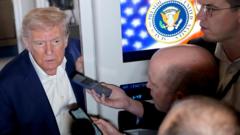US President Donald Trump's administration has officially exempted smartphones, computers, and other essential electronic devices from the recent "reciprocal" tariffs, which include hefty levies of 125% on imports from China. This decision by US Customs and Border Protection means that these products will be excluded from Trump's broader plan involving a 10% global tariff, with the Chinese import tax being considerably higher.
During a recent flight to Miami, Trump hinted at further details regarding these exemptions to be shared next week, stating, “We’ll be very specific. But we’re taking in a lot of money. As a country, we’re taking in a lot of money.” This development is seen as a significant shift in the tariff strategy, with one trade analyst calling it a “game-changer scenario” for the tech sector.
The exemptions, which are effective retroactively from April 5, cover not just smartphones but also other electronic components and devices such as semiconductors and memory cards. Dan Ives, head of technology research at Wedbush Securities, expressed optimism, tweeting that the exclusion of critical components "is a dream scenario for tech investors" and a pivotal moment regarding tariffs concerning China.
This decision came amidst rising concerns from US technology firms fearing price increases on gadgets, many of which are produced in China. The White House indicated that these exemptions were also meant to give companies additional time to relocate their production back to the United States in light of ongoing trade tensions.
White House Press Secretary Karoline Leavitt reiterated Trump's stance: "President Trump has made it clear America cannot rely on China for manufacturing critical technologies." Trump, currently at his Florida residence, expressed confidence in the effectiveness of high tariffs on China, suggesting they would yield positive results in time.
However, while these electronics now enjoy an exemption from the recently adjusted tariffs, they continue to be subjected to a 20% tariff related to Chinese fentanyl. Experts have suggested that without these exemptions, the price of iPhones and other popular devices could have surged dramatically, with reports estimating that iPhone costs might have tripled if end-users absorbed the full brunt of tariffs.
Amid shifts in the supply chain, Apple is accelerating efforts to produce devices in India as part of its strategy to diversify manufacturing locations and reduce dependency on China, which currently constitutes a significant portion of its smartphone production.
Originally, Trump intended to implement various steep tariffs against multiple nations this week, but later decided on a 90-day pause. He maintained, however, that China would continue facing a heightened tariff framework, hinting that these measures serve as negotiating tactics to gain advantageous trade relations.
The overarching goal of Trump's tariff policies remains clear—to rectify perceived imbalances in the global trading system while aiming to restore American manufacturing jobs.

















